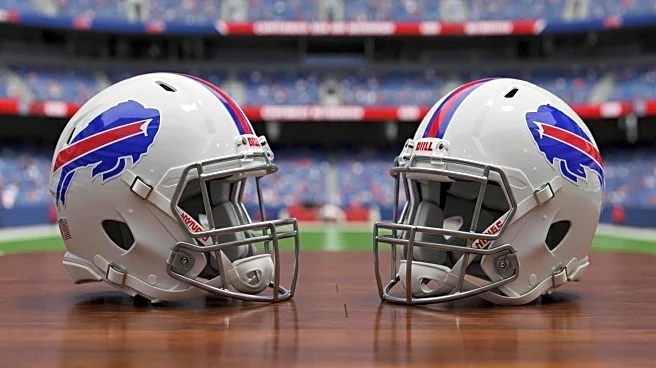What's Happening?
The Buffalo Bills have signed Pro Bowl running back James Cook to a four-year contract extension worth $48 million, including a $30 million guarantee. This agreement follows Cook's recent hold-in, and it ensures his presence with the team through the 2029 season. Cook's agent, Zac Hiller, expressed gratitude towards the Bills organization, emphasizing Cook's commitment to the team. Meanwhile, Cleveland Browns rookie quarterback Shedeur Sanders is unlikely to play in the upcoming preseason game against the Philadelphia Eagles due to an oblique injury. Additionally, Atlanta quarterback Michael Penix Jr. was involved in a fight during a joint practice with the Tennessee Titans, highlighting tensions in preseason activities. Odell Beckham Jr., a free agent wide receiver, announced via Twitter that he does not plan to retire, despite rumors suggesting otherwise.
Why It's Important?
James Cook's contract extension is significant for the Buffalo Bills as it secures a key player for the team's future, potentially enhancing their competitive edge in the NFL. Cook's performance and commitment are crucial for the Bills' strategy and long-term planning. The preseason developments, including injuries and player interactions, are vital for teams to assess their rosters and make necessary adjustments before the regular season. Odell Beckham Jr.'s decision to continue playing could impact team dynamics and free agency negotiations, as his experience and skills remain valuable assets in the league.
What's Next?
The Buffalo Bills will continue to integrate James Cook into their offensive strategies, aiming to maximize his contributions. Cleveland Browns will monitor Shedeur Sanders' recovery, potentially adjusting their quarterback lineup for upcoming games. Atlanta Falcons may address the tensions observed during the joint practice to ensure team cohesion. Odell Beckham Jr. will likely explore opportunities with interested teams, potentially influencing roster decisions and free agency market dynamics.
Beyond the Headlines
The NFL preseason serves as a critical period for teams to evaluate player performance, manage injuries, and refine strategies. The interactions and decisions made during this time can have long-term implications for team success and player careers. The dynamics observed, such as player conflicts and contract negotiations, reflect broader themes of competition, resilience, and strategic planning within professional sports.









